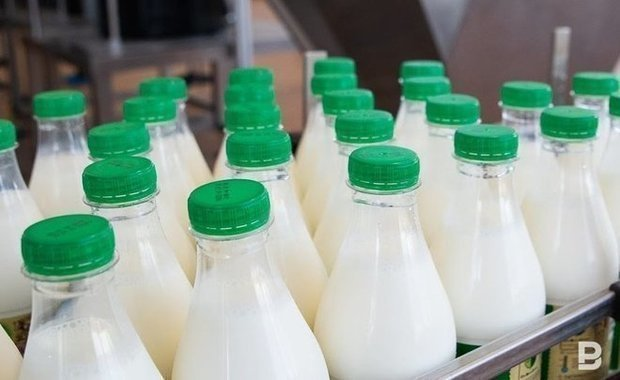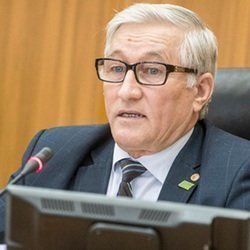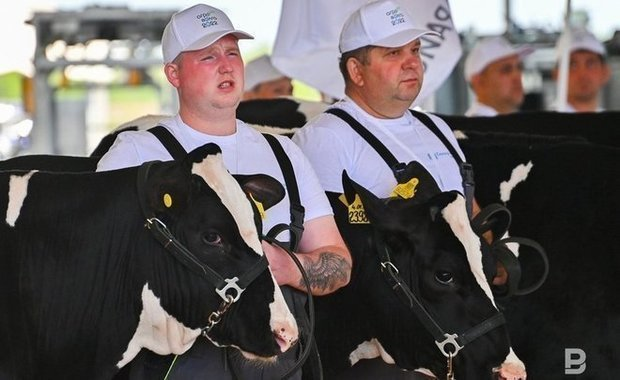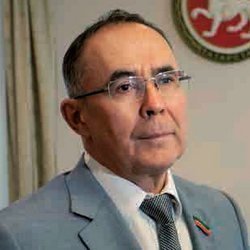‘Livestock reduction is a very dangerous occurrence’
Why Tatarstan farmers can’t expand dairy farm capacities
The amount of cattle in Russia has reached a record low — a fall to nearly 17 million head. The agro-industrial sector had 57 million even in the turbulent 1990s. This problem didn’t bypass Tatarstan’s farms either — in the last year, the cattle reduced by 1,300, the amount of sheep decreased by 2,800. Some experts believe that meat and milk consumption in the country now is below the Health Care Ministry’s standard. Others think that the sudden fall in milk purchase prices are the root of the problem. Realnoe Vremya’s correspondent sorted the situation out.
“Are 20 rubles a good price?”
Graduating from Kazan Veterinary Academy in 2002, Kazan citizen Eldar Makhmudov moved to Mendeleyevsk District where he worked as vice veterinary inspector for several years. But in 2007, he decided to create his own farm. He started with two pigs, then got cows — this is how he developed the farm step by step.
Today Eldar’s dairy farm has 140 cows, besides this, the farm has 100 sheep and nearly 1,000 hectares of land. However, now, the honourable farmer of the republic admits, he will have to reduce the livestock:
“Is there any other way? Milk prices are low, are 20 rubles a good price? Processors used to buy our milk for 33.5 rubles per litre. What’s the price in groceries today? It doesn’t fall, it only grows! Where is the money falling out? This question is for the Federal Anti-Monopoly Service. Inspect the buyer, processor or seller, where my 13 rubles went. What we have as a result: if it was enough for me to make 15 tonnes of milk to repay all my loans and leasing, which is about 600,000 rubles, before the purchase price decreased, today I have to make twice more milk. And to get milk, the cow has to be impregnated first, then wait for the calf to be born, this takes 34 weeks. What can happen to us during this time?”
There can be no food safety unless there is state regulation of prices for socially important products, including milk, Makhmudov is sure:
“There is an impression that nobody cares about how a rural farm lives. Compare yourself, diesel fuel costs 53 rubles per litre, moreover, its production costs are very lower, it comes almost from the soil. While a farm has tens, hundreds of living organisms that require care, food, and this organism has to make milk or meat.”
His colleague, farmer from Aznakayevo District Danis Sarguzin also complains that today there are no normal milk prices corresponding to costs. This is the main reason of the problem of the reduction of livestock, he considers:
“Big agricultural farms will be at a greater advantage today than small farms. It is unprofitable for small farms to keep a lot of livestock, though many received grants to deliberately open dairy farms. One can survive with meat production, while for those who make milk it is hard to survive today.”

“Farmers quickly make a decision: if it isn’t profitable, they won’t keep a farm at a loss”
Head of the Tatarstan Association of Farmers and Farms Kamiyar Baytemirov notes that today livestock at farms is reducing today, first of all, because of those farms where milk is produced. Moreover, it is characteristic not only for the republic’s farms but also for Russian in general.
The livestock reduction is topical for big farms too: the cattle of big Tatarstan agricultural producers has reduced by 903 head in the last week. It is measured in tens of head among farmers.
Baytemirov confirmed that a sudden fall in milk purchase prices became the main reason, which impacts not only agricultural producers but also the region’s economy in general:

The head of the association thinks supervisory agencies should join the solution of the problem: “I think the Anti-Monopoly Service doesn’t oversee pricing. Is it that nobody tells it to go ahead or should the service act on its own? Somebody thinks it is conspiracy of processors, some say about deliberate damage.”
The share of arms in the total amount of the economy of Tatarstan’s agro-industrial sector has started to fall since last year, the expert notes. If, according to Baytemirov, it held 51.7% in the gross agricultural produce volume, in 2022, it did 47%. Perhaps, he says, there is artificial reduction of indicators too because the lower the indicator of efficacy of small farms, the fewer state subsidies they will be given. Today small farms get just 20% of the pie of subsidies — big agricultural enterprises get the rest. Moreover, there is a paradoxical situation — their livestock is also decreasing despite the intensive state support.
Moreover, the tendency for livestock reduction is seen in other husbandry too. For instance, the number of sheep decreased to 37.100 (-2,800). Even though lamb meat has quite a high price, farm owners have slaughter these animals, which are mainly kept in private and small farms.
Baytemirov thinks that the land factor is the reason here:
“Big agricultural holdings, enterprises started to appropriate pastures, and the pasturage area decreased, there is none left in some districts, while sheep can’t be kept at the farms densely, they must graze. As a result, they have to reduce the livestock to get good meat. This means if the state considers that it needs not only cattle but also sheep, the privatisation of lands designed for pasture should be prohibited,” the interlocutor of the newspaper offers.
To increase the role of agricultural producers, raise this sector of the economy to a high level, the country should develop another agroeconomic policy, Kamiyar Baytemirov is convinced: “We have long been saying that a policy is needed where farmers will be protected from functionaries’ arbitrary power and arbitrary laws that are adopted without considering farmers’ interests. We offer the Ministry of Agriculture to create an integrated development programme of farms, consumer cooperatives and develop rural territories because it is impossible to develop ourselves and develop the sector without it.”
A glass of milk is at stake
The Tatarstan minister of agriculture and food paid attention that they couldn’t allow a livestock reduction as early as March: “A livestock reduction among farmers with the support provided for their development isn’t acceptable. Direct support alone for small farms only they use was 1.4 billion rubles in 2022. Also, farms got another 1.4 billion using other types of support in line with big agricultural producers,” Marat Zyabbarov complained.
Vice Chairman of the Tatarstan State Committee for Environment, Nature Management, Agro-Industrial and Food Policy Takhir Khadeyev also relates the problem to the new pricing policy: “Trading enterprises and milk buyers dictates prices today. Pay attention to the fact that if the purchase price decreased by 8 rubles, the milk price didn’t decrease either by 8 kopeks nor 8 rubles.” The deputy is also convinced that Anti-Monopoly Service workers should join the solution of the problem.

At the same time, the expert believes that the situation is a compilation of factors. So one of them is the format of farming that changed when some of its owners received state support measures, subsidies to develop the farm change the type of activity in five years becoming a personal farm.
It is easier to run such an agricultural business due to many parameters, including from a perspective of taxation, Takhir Khadeyev explains his point of view. He believes that a glut in the milk market ranks first:

To increase the competitiveness of agricultural producers in the market and save the cattle at farms, it is necessary to increase the population’s purchasing power, Khadyev believes:
“People should consume a quality product made at our farms and our fields more. Did we really forget the dry 2021 when the basic Borscht basket tripled in price? Do we have to take this road again? No way!”
According to him, it is necessary to lower prices in groceries. “This lopsided game won’t give any good results. Time will pass, other steps will be taken, but today this is a must. What is at stake is to just increase the consumption of milk by one glass per Tatarstan resident, which will in the end require additional production of 800 tonnes of milk, so its surplus will reduce.”
He says that milk production is, so to speak, ungrateful job, a hard job around the clock, it is not a machine tool that can be switched off.
“This job is created for years, it takes the cow three years and more to start making milk properly. A farm isn’t a brick factory or any other production plant, it is living nature. And livestock reduction is a very dangerous occurrence to provide the country’s food safety further. Yes, we have it all in groceries today, but products don’t appear in one day — it is a systemic work. Sadly, today the picture is so that large farms will also start to decrease the amount of livestock. This is why everybody should actively be involved in solving this problem: representatives of executive, legislative power, businesses and public organisations,” the parliamentarian concluded.